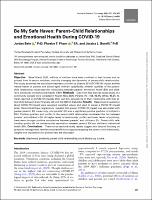Please use this identifier to cite or link to this item:
https://hdl.handle.net/20.500.12202/9317| Title: | Be my safe haven: Parent-child relationships and emotional health during COVID-19 |
| Authors: | Bate, Jordan Pham, Phoebe T. Borelli, Jessica L. |
| Keywords: | attachment pandemic parent–child relationships social distancing trauma behavioral medicine emotions mental health wounds and injuries pandemic COVID-19 |
| Issue Date: | 2021 |
| Publisher: | Oxford University Press for the Society of Pediatric Psychology |
| Citation: | Bate, J., Pham, P. T., & Borelli, J. L. (2021). Be My Safe Haven: Parent-Child Relationships and Emotional Health During COVID-19. Journal of Pediatric Psychology, 46(6), 624–634. https://doi.org/10.1093/jpepsy/jsab046 |
| Series/Report no.: | Journal of Pediatric Psychology;46(6) |
| Abstract: | Objective ¶ Since March 2020, millions of children have been confined to their homes and restricted from in-person activities, radically changing the dynamics of parent–child relationships. This study examines the association between coronavirus disease 2019 (COVID-19) impact and the mental health of parents and school-aged children; specifically, whether qualities of the parent–child relationship moderated the relationship between parents’ emotional health (EH) and children’s emotional and behavioral health (EBH). ¶ Methods ¶ Data from this Internet-based study of a community sample were collected in March–May 2020. Parents (N = 158, 92.4% White, 96.2% female) reported on COVID-19 impacts, their own EH, perceptions of their relationship with their eldest child between 6 and 12 years-old, and the EBH of that child. ¶ Results ¶ Responses to questions about COVID-19 impact were assigned weighted values and used to create a COVID-19 impact scale. Hierarchical linear regressions revealed that greater COVID-19 impact was associated with greater parents’ EH issues only, and parents’ EH was a significant positive predictor of children’s EBH. Positive qualities and conflict in the parent–child relationship moderated the link between parents’ and children’s EH. At higher levels of relationship conflict and lower levels of positivity, there were stronger positive associations between parents’ and children’s EH. Parent–child relationship quality did not moderate the association between parents’ EH and children’s behavioral health (BH). ¶ Conclusions ¶ These cross-sectional study results suggest that beyond focusing on symptom management, families may benefit from supports targeting the parent–child relationship. Insights and implications for practitioners are discussed. |
| Description: | Scholarly article / Open access |
| URI: | https://doi.org/10.1093/jpepsy/jsab046 https://hdl.handle.net/20.500.12202/9317 |
| ISSN: | 0146-8693 |
| Appears in Collections: | Ferkauf Graduate School of Psychology: Faculty Publications |
Files in This Item:
| File | Description | Size | Format | |
|---|---|---|---|---|
| Bate Be My Safe 2021 624-634.pdf | 293.77 kB | Adobe PDF |  View/Open |
This item is licensed under a Creative Commons License

